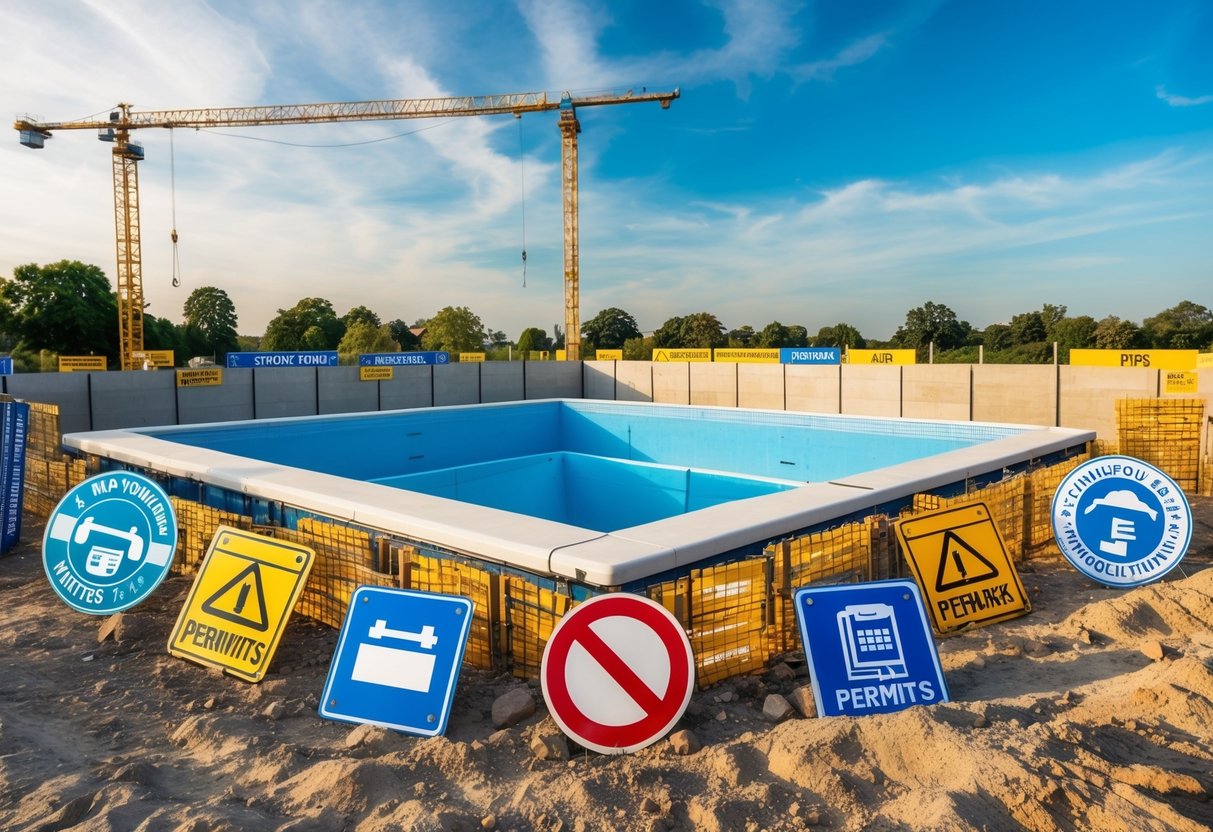Understanding Permit Requirements for Pool Construction
When constructing a swimming pool in Atlanta, it’s important to be aware of the specific permits and regulations. These rules ensure safety and compliance with local standards.
Navigating Fulton County Pool Regulations
In Fulton County, pool construction requires careful attention to regulations. First, we need to review zoning rules to ensure the pool is allowed in the area. Determining land use is crucial for compliance.
Next, let’s consider development and environmental health services. These authorities ensure that our project doesn’t harm the environment and adheres to health standards, protecting both people and nature. Submitting a completed application to relevant bodies is essential.
Application reviews may require adjustments to our plans based on feedback. Thus, getting approval involves staying informed and responsive to feedback from various departments.
Permitting Process in Metro Atlanta
The permitting process in Metro Atlanta starts with gathering necessary documents. For new constructions, we must apply for specific swimming pool construction permits. They often include architectural and engineering plans. Acquiring permits also involves paying appropriate fees, which vary by city and project scope.
Once we’ve gathered our documents and paid the fees, submitting the permit application is next. It’s crucial that our application is complete to avoid delays. Tracking our application’s progress using resources like the HBW database can help us stay updated.
Finally, working closely with city officials ensures that we meet all requirements, easing the path to starting our pool project.
Impact of Construction Regulations on Regional Growth

Construction regulations shape the expansion of regions like Metro Atlanta by influencing building activity, inspections, and growth. The comparison of pool construction trends among states shows differences in regulations and their impacts.
Metro Atlanta’s Building Activity Analysis
In Metro Atlanta, construction regulations are crucial to managing the growth and safety of new projects. Gwinnett and Cobb counties are examples where ordinances ensure that structures meet high standards. These standards impact not only pool contractors but also commercial building activity.
Data from HBW indicates a noticeable effect of regulations on year-over-year development in the metro area. By requiring frequent inspections, counties ensure projects are up to code, preventing potential hazards and boosting public trust. Despite regulations, there’s a noted decrease in some construction activities, showing a balancing act between growth and safety.
Comparison of Pool Construction Trends Across States
Pool construction trends vary significantly across states like Georgia, Florida, Texas, and Alabama. In Georgia, stringent regulations may slow down the pace compared to states like Florida, where warmer climates drive higher pool demands despite similar rules.
Reports from HBW highlight differences in how regulations influence construction. Georgia’s careful inspection process contrasts with Oklahoma’s approach, resulting in diverse development rates.
Texas demonstrates how moderate regulations encourage growth without sacrificing safety, presenting a model for others. Each state’s policies determine the pace and safety of development, affecting regional growth and contractor strategies.
Protocol for Pool Inspections and Operational Compliance

In Atlanta, pool inspections ensure that both public and residential pools meet safety and operational standards. These inspections help maintain the quality and safety of water, ensuring a healthy environment for users. Timing, documentation, and understanding of permits play a critical role in compliance.
Management of Public and Residential Pool Inspections
We oversee the inspections of public and residential pools with precise measures. Public pools, due to their usage, require more frequent inspections to ensure hygiene and safety. Gwinnett County, for example, has strict guidelines. Cobb County implements a detailed checklist for inspectors, ensuring pools meet health regulations.
Residential pools also undergo inspections, although these may be less frequent. It’s vital to check for things like secure barriers, clean water, and proper signage. Homeowners must stay alert to scheduled inspection dates and comply with local codes, keeping pools safe for personal use and visitors.
Understanding Seasonality and Permit Expirations
Pools often operate on a seasonal basis, usually closing during the colder months. As we look to open for the summer, ensuring permits are current is key. Permit expirations can halt pool operations, leading to fines. Staying organized with documentation, such as permit expiration dates, helps us avoid operational disruptions.
For counties such as Paulding, specific times of year require extra diligence in renewing permits. Understanding local timelines and requirements ensures our pools are ready when we want to dive in. Keeping track of invoices and renewals can prevent any downtime as we face the exciting swimming season.

